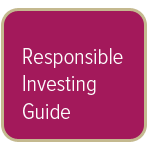The world of ESG
What is the 'Environmental, Social And Governance (ESG) Criteria
The Environmental, Social And Governance (ESG) Criteria is a set of standards for a company’s operations that investors use to screen investments. ESG research is designed to provide critical insights that can help institutional investors identify risks and opportunities that traditional investment research may overlook.
Why consider ESG?
- recognition in the financial community that ESG factors play a material role in determining risk and return;
- understanding that incorporating ESG factors is part of investors’ fiduciary duty to their clients and beneficiaries;
- concern about the impact of short-termism on company performance, investment returns and market behaviour;
- legal requirements protecting the long-term interests of beneficiaries and the wider financial system.
- pressure from competitors seeking to differentiate themselves by offering responsible investment services as a competitive advantage;
- beneficiaries becoming ever-more active and demanding transparency about where and how their money is being invested.
- value-destroying reputational risk from issues such as climate change, pollution, working conditions, employee diversity, corruption and aggressive tax strategies in a world of globalised and social media.
BREAKING DOWN 'Environmental, Social And Governance (ESG) Criteria
ENVIRONMENTAL (E) - Environmental criteria look at a company’s energy use, waste, pollution, natural resource conservation and animal treatment. They also evaluate which environmental risks might affect a company’s income and how the company is managing those risks. For example, a company might face environmental risks related to its ownership of contaminated land, an oil spill it was responsible for, its disposal of hazardous waste, its management of toxic emissions or its compliance with the government’s environmental regulations.
Examples:
- climate change
- greenhouse gas (GHG) emissions
- resource depletion, including water
- waste and pollution
- deforestation
SOCIAL (S) - Social criteria look at the company’s business relationships. Does it work with suppliers that hold the same values that the company itself claims to hold? Does the company donate a percentage of its profits to the community or perform volunteer work? Do the company’s working conditions show a high regard for its employees’ health and safety? Are stakeholders’ interests taken into consideration?
Examples:
- working conditions, including slavery and child labour
- local communities, including indigenous communities
- conflict
- health and safety
- employee relations and diversity
GOVERNANCE (G) - With regard to governance, investors want to know that a company uses accurate and transparent accounting methods, and they want to see that common stockholders are allowed to vote on important issues. They also want companies to avoid conflicts of interest in their choice of board members. Finally, they prefer not to invest in companies that engage in illegal behavior or use political contributions to obtain favorable treatment.
Examples:
- executive pay
- bribery and corruption
- political lobbying and donations
- board diversity and structure
- tax strategy
MSCI ESG Ratings & Controversies
MSCI ESG Research provides in-depth research, ratings and analysis of the environmental, social and governance-related business practices of thousands of companies worldwide. Our research is designed to provide critical insights that can help institutional investors identify risks and opportunities that traditional investment research may overlook. Our clients use our research to help implement their responsible investment objectives.
MSCI ESG Ratings are designed to help institutional investors understand ESG-driven risk and opportunities and integrate these factors into their portfolio construction and management process.
Our global team of 150 research analysts rates over 6,000 companies (11,000 total issuers including subsidiaries) and more than 350,000 fixed income securities globally. The team assesses thousands of data points across 34 ESG issues, focusing on the intersection between a company’s core business and the industry issues that can create significant financial risks and opportunities for the company. Companies are rated on a AAA-CCC scale relative to the standards and performance of their industry peers.
MSCI ESG Controversies is designed to provide timely and consistent assessments of ESG controversies involving publicly traded companies and fixed income issuers.
The tool monitors company involvement in notable ESG controversies related to the company’s operations and/or products, possible breaches of international norms and principles such as the UN Global Compact, and performance with respect to these norms and principles. Each Controversy is attributed a 0-10 score and a flag color depending on the severity of its environmental, social or governance impact.
MSCI ESG Controversies covers approximately 8,800 companies in the MSCI ACWI Investable Market Index, in addition to approximately 95% (by market value) of a leading fixed income index.
yourSRI’s “Fund & Portfolio Screening” tools
yourSRI’s ‘ESG & Controversies Fund & Portfolio Screening’ tools – an individual and cost efficient solution to measure and benchmark the ESG performance of your investments and to reveal hidden ESG-related investment risks.
- Investment reporting & controlling solutions with an objective and standardized framework for in-depth analysis
- Efficient benchmarking and peer group comparison
- monitor controversies in your investment portfolio and check your compliance with international norms and standards, such as the UN Global Compact
- Suitable for all funds, portfolios and mandates
yourSRI.com is partnering with MSCI, a leading data provider of ESG research and ratings.


